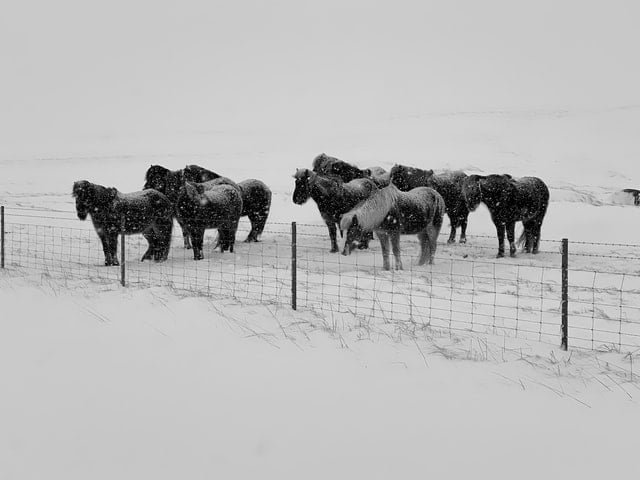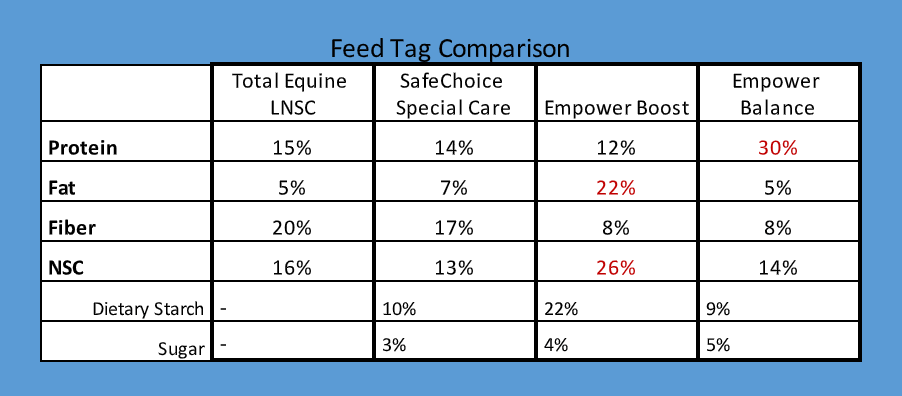Donkey Feed vs Horse Feed: What’s the Difference?

Donkey Feed vs Horse Feed: What’s the Difference?
Nutritional requirements for your hungry donkey
If feeding horses is not complex enough, feeding donkeys can be an even more difficult topic. Try to use good judgment, fact-check your resources, and consult an equestrian professional to ask specific questions.
Please note – this article is not intended to be exhaustive or to be used as a feeding guide for any individual animal. It’s just a summary of what we’ve learned so far!
The nutritional requirements of donkeys are similar and different from horses. These lessons learned help prepare us while bringing home two BLMs.
Key Nutrition Recommendations
Donkeys require fewer calories than horses. This is due to the efficiency of the digestive system and its small size (in general).
It is important not to confuse low-calorie and low-quality feed – donkeys still need vitamins and minerals and are just as susceptible to rot as horses.
Like horses, donkeys’ diet should consist of roughage (hay and hay). The specific feed may depend on your area and availability.
Both the horse’s and donkey’s digestive systems need time to adapt to the change. If you need to change their diet, do so gradually.
Donkeys may be more prone to obesity than horses. It is important to carefully monitor the degree of body condition and food intake.
The digestive system of horses
Both donkeys and horses share the same taxonomic classification from kingdom to genus, but then diverge at the species level.
This translates to: Donkeys and horses are similar, but not the same.
Reflecting on how the two species evolved can be helpful in understanding the digestive system better. Horses evolved on the plains and graze grasses. Donkeys have evolved in more mountainous terrain, browsing a variety of plants including woody shrubs as well as herbs.
Source: canva
Because of these differences in feed, donkeys have evolved to have a much stronger jaw than horses. (I mistook multiple fingers for carrots and can attest to that!) Much of what a donkey eats is lower in calories than the grasses available to horses. As a result, their digestive systems have evolved to be very efficient, extracting more nutrients than what they eat from those of horses.
While both horses and donkeys have the same total number of microbes in their digestive tracts, each species has evolved to possess different combinations of microbes specific to the species of feed consumed.
One common misconception is that donkeys require only low-quality feed. This is a misnomer – don’t confuse quality with calories. Donkeys still need vitamins and minerals, and are prone to colic from rotting feed, just like horses.
Donkeys can digest foods rich in fiber. One example is hay – as a “horse person” I would never think of feeding horses with hay. On the contrary, this is considered quite acceptable feed for donkeys. Think of it as celery for donkeys—it shouldn’t be the primary feed source for nutrients, but it’s a great additive to keep them occupied and their digestive system full, without adding unnecessary calories.
Note: Never feed moldy or dusty hay/hay to any animal – horse, donkey or other livestock.
fodder
Both horses and donkeys’ diets should come primarily from forage (usually in the form of hay or pasture). Horses should be fed 1.5-2% of their body weight each day in the form of feed. Donkeys require the same, 1.5% of their body weight.

The specific feed depends on what is available in your area. For donkeys, the preferred feed is barley straw, but this is not widely available in the United States. Hay is not usually grown for feeding in the United States, so it can be difficult to find hay that is free of mold and dust.
Alfalfa hay is an excellent feed choice for horses, but is too high in protein for donkeys.
Remember how efficient their digestive systems are? The extra protein makes the energy content too high and can cause obesity or laminitis in donkeys.
Source: canva
Grass hay is a good choice for both horses and donkeys. It is low in protein and sugar and high in fiber to be suitable for both animals. Always make sure that any hay you feed is free of mold, dust, and weeds.
We plan to keep some hay on hand for feeding during cooler temperatures. Additional roughage is important in the winter, as the horses digestive system produces heat during the fermentation of the fibers.
Feeding extra hay can help keep all types of horses warm in very cold temperatures.
For both animals, feeding high quality hay may meet their nutritional needs depending on their individual metabolism and workloads.
Horses are usually fed grain supplements that contain additional vitamins/minerals and calories. Donkeys generally don’t require additional calories, so grains may not be a good idea. Donkeys need vitamins and minerals, so if they are not getting adequate levels/ratios in their hay, a supplement may be needed.
Supplements vs. Concentrates
This can be a bit of a gray area. When discussing a equine diet supplement, a person can refer to two different types of feed.
The grain is fed as a “supplement” to hay and is also referred to as a concentrated feed. Provides additional vitamins, minerals and calories that may not be available in offered hay and is generally measured in pounds. Only grain feed designed for horses.
Cattle species have varying vitamin and mineral needs, and the amounts/ratios can be quite different. For example, copper is toxic to sheep and goats, but it is an essential mineral in a horse’s diet. Ruminants such as cattle may require a medicated feed with bovatic or romensin, both of which are toxic to horses.
Supplements are formulated to add additional vitamins and/or minerals in a concentrated form – usually measured in ounces. Supplements do not provide a significant source of calories (unless you are feeding a weight-building supplement).
Source: canva
Most donkeys do not require grain or concentrate, provided they have good quality hay. If you have a pregnant, nursing, elderly or athletic donkey, they may need additional calories, in which case cereals would be a good choice. Regardless, not all grains are created equal.
Remember, donkeys are very efficient at digesting both protein and energy – so look for a grain that’s low in sugar and protein.
Steer clear of textured feeds (they are coated with molasses which is high in sugar. Also, don’t buy a top improver or ration balancer (rich in protein).
In general, avoid anything that contains corn as an ingredient. Corn is high in starch and is not good for the digestive system of horses (horses or donkeys).
Look for feeds that are low in non-structural carbohydrates. Donkeys appear to be fed low NSC feeds designed for horses that have metabolic concerns.
Not all feed companies say this on the label, so you may need to do a little research or math to be able to compare feed labels “apples to apples.” What is NSC? NSC stands for non-structural carbohydrates. The equation for calculating it is very simple – just add starch + sugar to get the total NSC for that particular feed.
I started my research by comparing the tags on four different horse feeds that I was familiar with:

After reviewing the levels above, we decided to try SafeChoice Special Care with burros. It was the lowest in protein and NCS, and still had probiotics, probiotics, biotin, and added amino acids.
salt
Similar to horses, salt must be provided freely. We bought an antique salt block that was made for horses. Our trainers feed the donkeys loose Himalayan salt.
You can also buy Himalayan “salt on a rope” which is used as a salt source and general entertainment.
Source: canva
treats
We’ll keep things simple to get started. Carrots are an excellent choice because they are low in calories (and cheap) and the downside is their shelf life, especially at cooler temperatures.
Another donkey favourite is the Animal Crackers – the regular, unfrozen variety!
Source: canva
Shredded beet pulp is another fiber-rich treat suitable for donkeys, provided you can find it without adding molasses. This is a by-product of sugar beet processing which means it should be low in sugar/energy, because the processing removes the sugar.
Watch out, though. Some companies add sugar again in the form of molasses for palatability.
Always soak beet pulp before feeding to reduce the risk of developing colic. Another benefit of beet pulp? Makes a great hot puree in the winter to encourage hydration.
Electrolytes
If the donkey is not feeling well, it may be worth adding some electrolytes to his food. You can mix electrolytes with cereal, treats, or grated (soaked) beet pulp as discussed above.
Want to watch the progress of Blu and the Moon? Follow them on Instagram!
Frequently Asked Questions
Why is obesity dangerous for donkeys?
Obese animals have increased risk of many health problems such as laminitis, founder, and joint problems. Donkeys are more prone to hyperlipidemia, a condition caused by stress and/or an underlying condition. Hyperlipidemia is a serious condition that can lead to organ failure and death.
What can you do with donkeys?
Donkeys make wonderful pets and working animals. They can be used for riding (consider weight limits), driving, packing and even boro racing. Donkeys can be good keepers of livestock and can be used as healing animals.
Can you adopt a donkey?
yes! There are two general ways to adopt a donkey in the United States. The first is to adopt a BLM borough (or coach). As of 2022, you can already get $1,000 back for adopting a wild bug. The second is adoption from one of several donkey rescues or sanctuaries, such as Peaceful Valley Donkey Rescue, which operates throughout the lower 48 states along with Hawaii and the Caribbean.
Safely make progress and disclaimer:
This article is designed to be helpful, detailing what I learned during my research on donkey feeding. After working with horses for over 20 years, I was surprised to learn all the differences between feeding horses and donkeys.
Please contact your vet or equine/donkey specialist with specific nutritional questions.
PS Enjoy this article? Jog on over:
sources:
https: // www.nutrenaworld.com/product/safechoice-special-care-horse-feed



